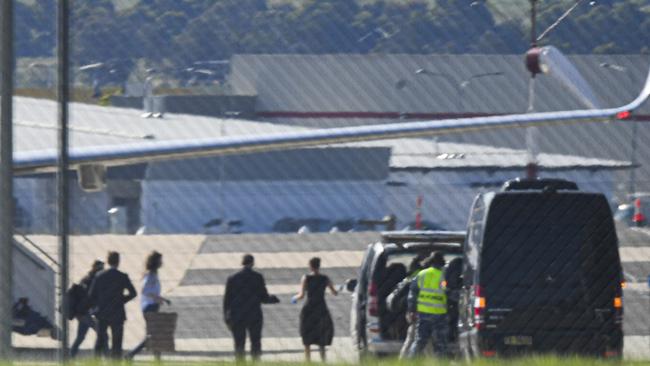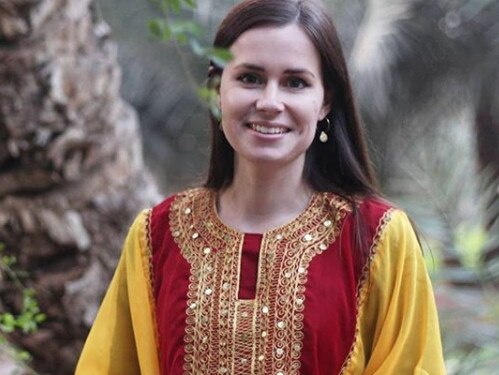Kylie Moore-Gilbert, Julian Assange are cousins, former diplomat says
Another source has supported a claim freed academic Kylie Moore-Gilbert and WikiLeaks founder Julian Assange are related.
National
Don't miss out on the headlines from National. Followed categories will be added to My News.
Melbourne academic Kylie Moore-Gilbert is the cousin of WikiLeaks founder Julian Assange, sources say.
Assange’s partner Stella Moris last week said that Moore-Gilbert was his cousin and that he lobbied the Iranian government for her release from his southeast London jail cell.
“Julian’s cousin Kylie Moore-Gilbert has been released!” she wrote on Twitter.
“Julian had petitioned Iran’s leaders to release her earlier this year.”
Former British foreign diplomat Craig Murray repeated the claim yesterday.
I was asked to keep confidential that Kylie Moore-Gilbert was Julian's cousin, in case it complicated her release.
— Craig Murray (@CraigMurrayOrg) November 29, 2020
Now that she is free, it is a good moment to say what a remarkably brilliant family they are, and I trust it is a good omen for Julian.
Assange, who took refuge in the Ecuadorean embassy in London for seven years, is on remand in Belmarsh prison.
He is fighting extradition to the United States on spying charges, which carry a maximum 175-year jail term.
Dr Moore-Gilbert touched down at Canberra Airport last Friday on a chartered plane as part of the secret mission to bring her home.
The 33-year-old appeared in good health after spending more than two years locked up in Iran, most of which was in solitary confinement in unit 2a of Evil prison.
She was met by health officials and members of the Australian Defence Force in Canberra before being reunited with relieved relatives.
It was understood she would now complete two weeks’ quarantine.

Moore-Gilbert celebrated her freedom with a Tim Tam and the “best cup of coffee she has had in two years”.
The University of Melbourne Middle East expert enjoyed the treat during her flight back to Australia from Tehran.
She had been held there for 804 days on spying charges that she strongly denied.
“Kylie had her first decent cup of coffee in two years on the plane, and a Tim Tam,” a source said.
Dr Moore-Gilbert’s family said earlier this week they were “relieved and ecstatic” at her release.
“We cannot convey the overwhelming happiness that each of us feel at this incredible news,” they said in a statement.
“Our family sincerely thanks the Australian government for its sustained efforts to secure Kylie’s freedom, in particular Marise Payne, Lyndall Sachs and Scott Morrison.
“We also recognise all those who worked so tirelessly behind the scenes to achieve this outcome.”
Dr Moore-Gilbert was released in exchange for three Iranian who had been involved in a bungled Bangkok bomb plot.
However, the Australian government would not confirm the prisoner-swap deal.
The Australian reported that Nick Warner, the director general of National Intelligence, ran a secret year-long campaign to secure Dr Moore-Gilbert’s release.
He used contacts in the Islamic Revolutionary Guard Corps, whom he had met while working as Australia’s ambassador to Iran in the 1990s, to get her out.
The IGRC is a significant power in Iran, and Dr Moore-Gilbert was kept in cells under its control, rather than the national government during her time there.

Foreign Minister Marise Payne said Australia had “consistently rejected” the grounds on which Dr Moore-Gilbert was detained by Iran, but declined to confirm reports her freedom was brought about as a result of the release of three Iranian citizens.
“Every case of this nature is considered individually and the best strategy is carefully considered,” she said.
Ms Payne said she was “extremely pleased” Dr Moore-Gilbert had been released from her “unjustified detention in Iran” and would soon be able to resume her normal life.
“This is cause for great relief and also great joy today,” she said.
Journalist Peter Greste, who was imprisoned in Egypt for more than two years, said he expected Dr Moore-Gilbert would find it hard to resume a normal life.
“It’s going to be impossible, there is no normal after something like this,” he said on Sunrise.
“You have changed, the people around you have changed, the world has changed, and it’s just impossible to go back to the life you had before.”
Mr Greste said he spent a lot of time grieving the life he couldn’t get back before realising he had to build a life moving forward.
“That is on top of all of the really dark, complex emotions that she is going to be going through as she processes the really traumatic time she has spent inside that Iranian cell,” he said.
– additional reporting Josh Fagan and Jade Gailberger


